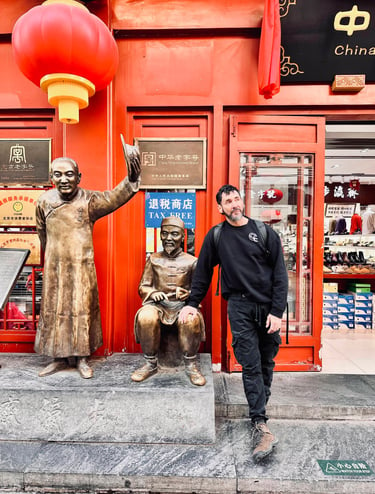Beijing
Travelblog
TRAVEL
It took a little longer, but here is my travel blog about Beijing :-). First of all: Why Beijing? As you know, I really enjoyed Taipei. My trip to Taiwan, also known as the “Republic of China,” was the perfect mix of East and West for me. As a new adventure, I wanted to draw a direct comparison with the other China, the “People’s Republic of China,” and its capital, Beijing. Like every journey, this one started with research. What stood out to me was that most travel bloggers had similar prejudices about Beijing before their trips. Beijing? For many, it was synonymous with smog, unfriendly people, chaotic traffic, surveillance, dirt, chaos, and high prices. I can already reveal this: Beijing surprised me.
Since I gained so many new impressions and insights during my trip, I decided to split the blog into two parts. In the first part, I want to address the biggest stereotypes many of us have about China—particularly censorship and surveillance. The second part will focus on Beijing as a city and my experiences there, from food and attractions to the people.
It’s important for me to emphasize that this blog is written from the perspective of a tourist. It’s about how I experienced the city during my trip, not about evaluating complex political topics. My goal is to share the impressions that stand out to a visitor and perhaps give you some food for thought.
So, let’s dive into Part 1:
Preparations and Censorship
For every trip, the key topics for me are internet, money, and transportation. In China, these three are closely connected. Without functional internet on your phone, you can barely manage anything in Beijing. That’s why a working data eSIM and a reliable VPN are essential, as China’s “Great Firewall” blocks platforms like Google and Instagram, officially to protect “political stability and cultural values.” At the same time, this measure has allowed domestic services like WeChat, Didi, and Alipay to grow without foreign competition, driving innovation forward. These apps now each have over a billion users and combine communication, payment services, e-commerce, and mobility. In Beijing, WeChatPay and Alipay are indispensable for using public transportation, buying tickets for attractions, or booking Didi, China’s version of Uber.
My thoughts on this: Isn’t this kind of “market distortion” questionable? What would the alternative be? In the West, payment services like PayPal and credit card companies dominate the market, but they’ve barely evolved their core offerings in years. This stagnates innovation, while in China, targeted market interventions have strengthened local businesses. The “Great Firewall” is officially framed as a measure to protect culture and stability, but it has primarily ensured that foreign service providers don’t interfere in the Chinese market.
Interestingly, many Chinese people openly use VPNs to access blocked content, seemingly without fear. This means anyone who wants to can access foreign content. At the same time, the difference between Apple and Google is a good example of how China strategically approaches the Firewall. Apple, as a hardware and technology company, is left untouched, while Google, as an information platform, is blocked. As a WTO member, China can argue that the Firewall is unrelated to economic interests and is purely for political stability. However, in practice, it has significantly contributed to the rise of Chinese apps like WeChat and Alipay, which are now seen as the next stage of payment service development. Elon Musk seems to have recognized this, as he plans to develop Twitter into a platform with similar multifunctionality.
Surveillance?
Another thing that immediately stands out in Beijing is the omnipresent surveillance. Cameras are everywhere—every few meters on the street, in public transport, and in shopping malls. It’s impossible to move around without being captured by them. While this level of surveillance is often viewed critically from our perspective, in China, it seems to be an accepted part of everyday life.
These cameras also provide data for the “Social Scoring” system. This system is designed to ensure that everyone behaves in a rule-abiding manner by rewarding positive behavior and penalizing negative actions. A high score can bring advantages, such as better access to credit or faster approvals, while a low score can result in restrictions, for instance, in job opportunities or access to public services.
Interestingly, while “Social Scoring” in China is often sharply criticized in the West, similar mechanisms here go largely unquestioned. One example is the SCHUFA in Germany, which evaluates our financial behavior and impacts whether we can get a loan or rent an apartment. Similarly, police clearance certificates are often required during job applications to determine if someone is a “good citizen.” The difference isn’t in the practice itself but in how it’s framed: In China, the system is openly visible and state-run, while in the West, it’s discreetly managed by private entities.
One notable difference: In Beijing, vandalism, graffiti, or unpleasant situations are hard to find. The city feels clean, safe, and well-organized—likely a result of the pervasive surveillance. It raises the question of why we perceive and judge such systems so differently.
Matze’s final tips: China is a communist country that is more capitalist than anything we know here. We should try to let go of old prejudices. Traveling to China doesn’t mean agreeing with all political decisions. It opens up the opportunity to explore new cultures, their values, and systems while also questioning your own. Censorship and surveillance do exist, but they have little to no direct impact on tourists. Well, maybe just a little—I did think twice about whether I threw my trash in the correct bin (yes, there’s recycling in Beijing too) because I felt watched :-). The city leaves an impression of cleanliness, safety, and order. More on that in the next blog… stay tuned…





